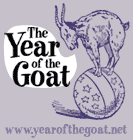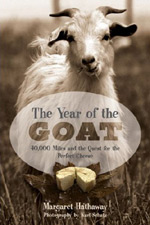The Common Ground Fair was a different story. The fair itself is a more political festival, organized by the Maine Organic Farmers and Gardeners Association to encourage organic farming and "green solutions" in the state. There were composting and worm farming booths, exhibits on solar and wind power, and several parked electric cars. Improvised bands of folk musicians played in a field; the food vendors sold grilled eggplant sandwiches and fruit smoothies.
Wandering around the fairgrounds, we met several goat farmers, two of whom raise goats for fibers. We hadn't yet spoken with the owners of any angora or cashmere goats, so meeting the women of Friends' Folly Farm (angora) and Springtide Farm (cashmere) offered a great opportunity to expand our goat horizons. The third farmer we spoke with, Charles Hopkins of Tramp's Rest, keeps a herd of Swiss dairy goats and is also a Certified Maine Guide. He had originally planned to use part of his herd as pack goats for hikers, but the idea never gained momentum, so now he concentrates on the dairy. We had never considered goats as pack animals, but Charles said that there were actually several farms in Maine that were experimenting with it.
What thrilled us about our experience at the Common Ground Fair was that, though we've been immersing ourselves in goat culture for a month, we were able to find three farms that were using goats in ways we hadn't encountered. The versatility of the goat is truly astonishing. Over the next few weeks we'll be visiting these farms, and we're really looking forward to learning more about their various goat industries--and picking up some more yarn for the puppets. — MMH


